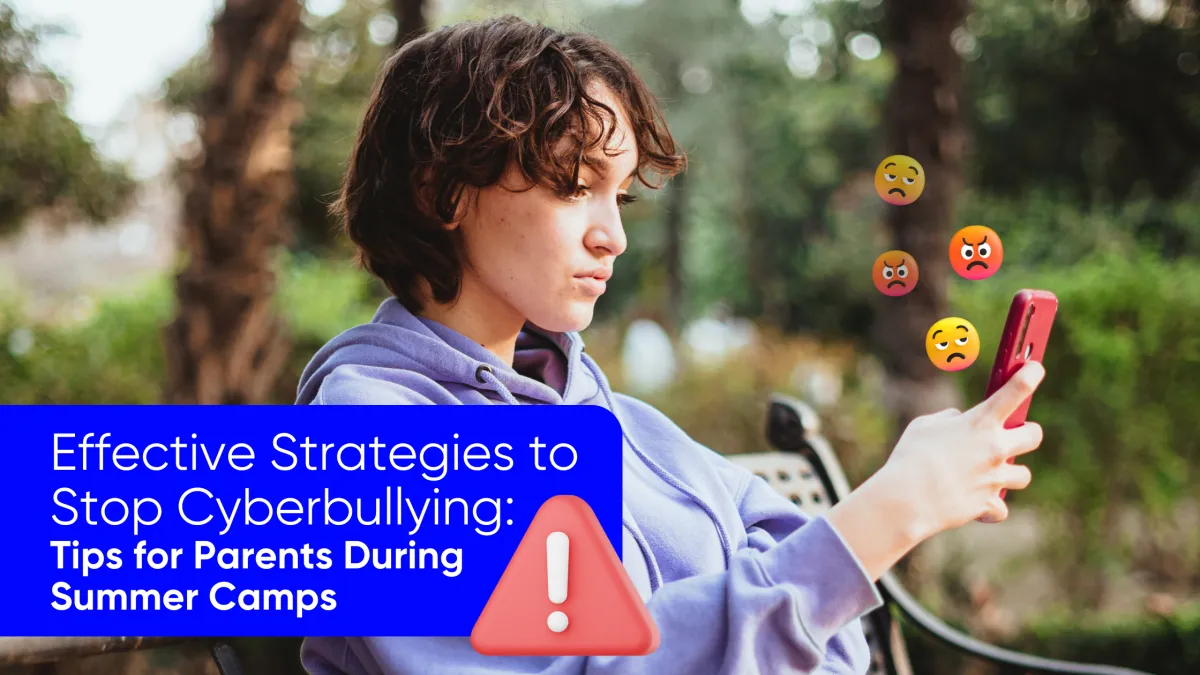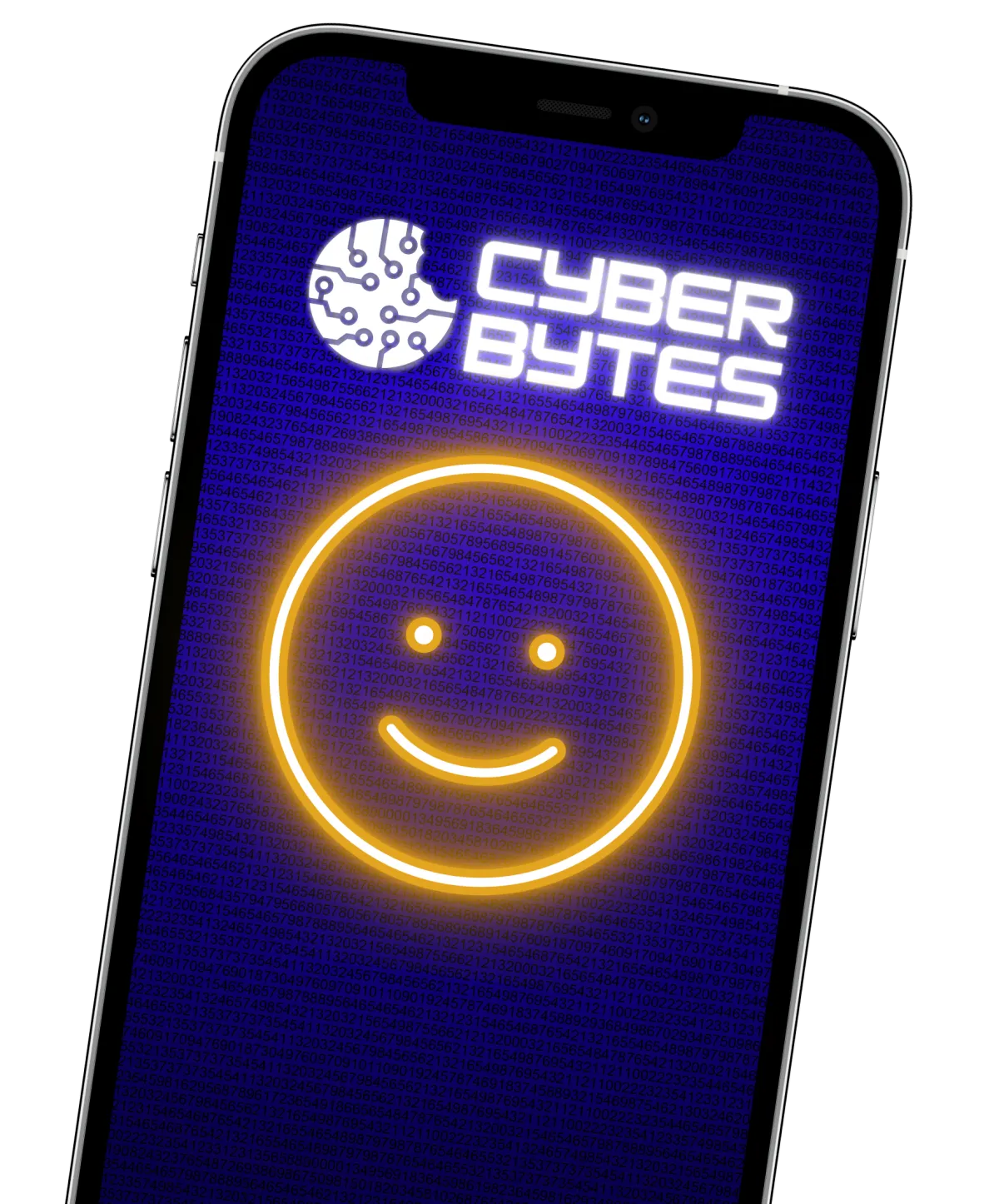You are what you click!
Learn how to make cybersecurity your way of life in an easy and guided way.
You are what you click!
Become Cyber savvy
EXPLORE BLOG BELOW
You are what you click!
Become Cyber savvy
You are what you click!
Become Cyber savvy
You are what you click!
Become Cyber savvy

Effective Strategies to Stop Cyberbullying: Tips for Parents During Summer Camps
The advent of technology has transformed how we live, learn, and communicate, making it easier for kids to stay connected during summer camps. However, this convenience brings a daunting challenge: cyberbullying. As we ship off our children to their exciting summer camp adventures, we ought to equip them with the right strategies to stop cyberbullying. Understanding how to stop cyberbullying, facts, effects, and prevention strategies can empower parents to safeguard their children in the digital space.
For those who love a structured approach, let’s start by understanding what cyberbullying is.

Understanding Cyberbullying
So, what is cyberbullying, and how does it affect individuals? Cyberbullying is the use of electronic communication to bully or harass others, typically through aggressive and repetitive messages. Its effects can be devastating, leading to anxiety, depression, and even suicidal thoughts among young victims. As a parent, it’s crucial to understand the gravity of these cyberbullying effects and the steps needed to stop it.
Cyberbullying Hurts!
Now, let’s look at how cyberbullying affects kids. It’s not just about hurt feelings. The effects can be pretty severe. It can lead to stress, fear, and even depression. It makes children feel lonely and can harm their academic performance. Some kids become scared to go online, and in extreme cases, it can lead to tragic outcomes.

Common Forms of Cyberbullying
If you’re someone who appreciates factual information, you should know that cyberbullying can take various forms. Being aware of cyberbullying facts, including its common forms, is a crucial first step to safeguard your children. Cyberbullying can manifest in various ways: from spreading rumors online, posting hurtful or threatening messages, to creating fake profiles or sharing embarrassing photos without consent. Moreover, the advent of social media platforms, messaging apps, gaming platforms, and forums have only multiplied these threats.
How to Prevent Cyberbullying
How can we prevent cyberbullying, particularly during summer camps where we cannot always supervise our kids? Here are a few actionable tips to prevent cyberbullying:
Encourage open communication: Let your children know they can talk to you about anything, especially if they face any distressing situation online.
Educate your kids: Teach your children about the dangers of cyberbullying and the importance of treating everyone with respect online. Explain what cyberbullying is and how it can be harmful. Talk about the different forms of cyberbullying, such as spreading rumors online, posting embarrassing photos or videos, and sending mean text messages.
Set rules: Establish rules for device usage and online interactions. Remind them never to share personal information online and to only interact with known and trusted individuals. Set your expectations for their online behavior, such as not posting anything that could be hurtful or embarrassing to others. Make sure they know that they can come to you if they see or experience cyberbullying.
Use technology: Leverage parental control tools to monitor your child’s online activities, restrict access to certain apps, or set usage time limits. This doesn’t mean you have to read every text message or social media post, but you should be aware of what your kids are doing online. You can do this by talking to them about their online activity, checking their social media accounts, and setting parental controls on their devices.
Teach your kids about digital citizenship. Help your kids understand the importance of being respectful and responsible online. Talk to them about the importance of privacy and how to protect their personal information.
Encourage bystander intervention: Encourage your children to stand up against cyberbullying if they see it happening, whether by reporting it to an adult or supporting the victim.
Encourage your kids to report cyberbullying. If your kids see or experience cyberbullying, encourage them to report it to you, a trusted adult, or the camp counselor. Cyberbullying is a serious problem, and it’s important to take steps to stop it.

Dealing with Cyberbullying
If your child is a victim, how should they respond? And as parents, how can you address cyberbullying? Here’s a guide:
Don’t respond or retaliate: Teach your child not to engage with the bully. Responding or retaliating often escalates the situation.
Save the evidence: Keeping a record of the bullying incidents can be helpful if you need to report them.
Report the incident: Most social media platforms, apps, and online games have options to report abusive behavior. It’s also important to report the incident to the camp authorities and, if necessary, to local law enforcement.
Provide emotional support: Be there for your child. Validate their feelings, reassure them it’s not their fault, and offer comfort and assistance.
Summer camps are meant to be fun and enriching experiences for your children. By understanding how to stop cyberbullying and using these prevention strategies, you can help ensure they enjoy their summer camp experience to the fullest. Remember, as parents, we are the first line of defense against cyberbullying. It’s up to us to equip our children with the knowledge, tools, and confidence they need to stay safe in the digital world.
How Summer Camp educators and trainers can address cyberbullying
Have a cyberbullying policy in place. This policy should outline what cyberbullying is, how it will be handled, and what consequences will be given to those who engage in cyberbullying.
Train staff on how to identify and respond to cyberbullying. This training should include information on what cyberbullying is, how to identify it, and how to respond to it.
Create a safe and supportive environment. This means creating an environment where kids feel comfortable coming forward if they are being bullied, and where they know that they will be supported.

Additional tips for parents:
Be Intentionally a role model. Model appropriate online behavior for your kids. If you’re not careful about what you post online, your kids are less likely to be careful about their own online behavior.
Be Aware and Supportive. If your child is a victim of cyberbullying, be supportive and understanding. Help them to feel safe and secure.
Be Mindful and Get involved. If your child’s camp has a cyberbullying policy, get involved in enforcing it. Help to create a safe and positive environment for all campers

Here are some additional FAQs about cyberbullying:
How can I teach my child about the dangers of cyberbullying?
One of the best ways to teach your child about the dangers of cyberbullying is to maintain open lines of communication about online experiences. Explain what cyberbullying is, how to recognize it, and why it’s harmful. Use real-life examples and news stories that are age-appropriate to emphasize its impact. Cyberbullying can have a serious impact on individuals, including causing them to feel sad, anxious, or even suicidal.
My child is witnessing cyberbullying, what should they do?
If your child is witnessing cyberbullying, it’s essential to discuss the importance of empathy and taking action. Teach them to report the incident to a trusted adult and to the platform where it’s happening. They should never participate in or encourage bullying behavior.
How can I create a safe online environment at home?
Creating a safe online environment at home includes setting clear rules about internet usage, having regular open discussions about online experiences, and using parental controls and monitoring tools to help protect your child online.
What are the signs that my child might be a victim of cyberbullying?
Signs might include sudden changes in device usage habits, avoiding discussion about their online activities, a drop in grades, changes in mood or behavior, withdrawal from social activities, or signs of depression or anxiety.
My child is the one cyberbullying others, what should I do?
If you find your child is cyberbullying, it’s crucial to address the issue seriously. Discuss the negative impact of their actions on others. Encourage empathy and understanding. If necessary, seek guidance from a counselor or other professionals to address underlying issues.
How can social media platforms help combat cyberbullying?
Many social media platforms have policies against cyberbullying and offer tools to report inappropriate or harmful content. They allow users to block or report accounts involved in cyberbullying. Encourage your child to utilize these tools.
How should victims of cyberbullying respond?
If your child is a victim of cyberbullying, remind them that it’s not their fault. Encourage them not to respond to the bully, as it might escalate the situation. Document the instances of bullying by taking screenshots or saving messages, as they might be needed for reporting later.
What are the common forms of cyberbullying?
Some of the most common forms of cyberbullying include:
Texting or messaging: This is the most common form of cyberbullying. Cyberbullies may send mean or threatening text messages, or they may post embarrassing photos or videos.
Social media: Cyberbullies may create fake profiles to spread rumors about their victims, or they may post embarrassing photos or videos.
Email: Cyberbullies may send mean or threatening emails, or they may use email to spread rumors.
Online gaming: Cyberbullies may use online gaming to harass or threaten their victims.How should victims of cyberbullying respond?
If you are a victim of cyberbullying, it’s important to remember that you’re not alone. There are people who can help you. Here are some tips on how to respond to cyberbullying:
Don’t respond to the bully. This will only make the bullying worse.
Save the evidence. This could include screenshots of text messages, emails, or social media posts.
Tell a trusted adult. This could be a parent, teacher, counselor, or another adult you trust.
Report the bullying to the website or app where it’s happening. Most websites and apps have policies against cyberbullying.
Take care of yourself. Cyberbullying can be stressful and upsetting. Make sure you’re taking care of your physical and emotional health.

Is it essential to involve law enforcement in cyberbullying incidents?
In severe cases, or when the bullying involves threats of violence, sexually explicit messages or photos, stalking, hate crimes, or taking a photo or video of someone in a place where they would expect privacy, it may be necessary to involve law enforcement. Always document and keep a record of incidents.
If you or someone you know is experiencing cyberbullying, don’t wait. Reach out to someone that can help you. By working together, parents and educators can help to create a safe and positive environment for all kids, free from cyberbullying.
Remember, awareness is the first step to prevention. Be open, discuss these issues, and create a secure online environment where your child can explore, learn, and connect without fear.
“Tips to Safeguard Your Children from Cyberbullying at Summer Camps” is more than just a guide—it’s a call to action. Be Intentional, Aware, and Mindful (Be I AM) and take charge today, and make your children’s digital safety a priority! Be I AM. Be I AM now!
Live Happily Ever Cyber!
Subscribe for more ways to protect what matters most to you against hackers, scammers, and Cybermonsters™
Latest blog posts:

Effective Strategies to Stop Cyberbullying: Tips for Parents During Summer Camps
The advent of technology has transformed how we live, learn, and communicate, making it easier for kids to stay connected during summer camps. However, this convenience brings a daunting challenge: cyberbullying. As we ship off our children to their exciting summer camp adventures, we ought to equip them with the right strategies to stop cyberbullying. Understanding how to stop cyberbullying, facts, effects, and prevention strategies can empower parents to safeguard their children in the digital space.
For those who love a structured approach, let’s start by understanding what cyberbullying is.

Understanding Cyberbullying
So, what is cyberbullying, and how does it affect individuals? Cyberbullying is the use of electronic communication to bully or harass others, typically through aggressive and repetitive messages. Its effects can be devastating, leading to anxiety, depression, and even suicidal thoughts among young victims. As a parent, it’s crucial to understand the gravity of these cyberbullying effects and the steps needed to stop it.
Cyberbullying Hurts!
Now, let’s look at how cyberbullying affects kids. It’s not just about hurt feelings. The effects can be pretty severe. It can lead to stress, fear, and even depression. It makes children feel lonely and can harm their academic performance. Some kids become scared to go online, and in extreme cases, it can lead to tragic outcomes.

Common Forms of Cyberbullying
If you’re someone who appreciates factual information, you should know that cyberbullying can take various forms. Being aware of cyberbullying facts, including its common forms, is a crucial first step to safeguard your children. Cyberbullying can manifest in various ways: from spreading rumors online, posting hurtful or threatening messages, to creating fake profiles or sharing embarrassing photos without consent. Moreover, the advent of social media platforms, messaging apps, gaming platforms, and forums have only multiplied these threats.
How to Prevent Cyberbullying
How can we prevent cyberbullying, particularly during summer camps where we cannot always supervise our kids? Here are a few actionable tips to prevent cyberbullying:
Encourage open communication: Let your children know they can talk to you about anything, especially if they face any distressing situation online.
Educate your kids: Teach your children about the dangers of cyberbullying and the importance of treating everyone with respect online. Explain what cyberbullying is and how it can be harmful. Talk about the different forms of cyberbullying, such as spreading rumors online, posting embarrassing photos or videos, and sending mean text messages.
Set rules: Establish rules for device usage and online interactions. Remind them never to share personal information online and to only interact with known and trusted individuals. Set your expectations for their online behavior, such as not posting anything that could be hurtful or embarrassing to others. Make sure they know that they can come to you if they see or experience cyberbullying.
Use technology: Leverage parental control tools to monitor your child’s online activities, restrict access to certain apps, or set usage time limits. This doesn’t mean you have to read every text message or social media post, but you should be aware of what your kids are doing online. You can do this by talking to them about their online activity, checking their social media accounts, and setting parental controls on their devices.
Teach your kids about digital citizenship. Help your kids understand the importance of being respectful and responsible online. Talk to them about the importance of privacy and how to protect their personal information.
Encourage bystander intervention: Encourage your children to stand up against cyberbullying if they see it happening, whether by reporting it to an adult or supporting the victim.
Encourage your kids to report cyberbullying. If your kids see or experience cyberbullying, encourage them to report it to you, a trusted adult, or the camp counselor. Cyberbullying is a serious problem, and it’s important to take steps to stop it.

Dealing with Cyberbullying
If your child is a victim, how should they respond? And as parents, how can you address cyberbullying? Here’s a guide:
Don’t respond or retaliate: Teach your child not to engage with the bully. Responding or retaliating often escalates the situation.
Save the evidence: Keeping a record of the bullying incidents can be helpful if you need to report them.
Report the incident: Most social media platforms, apps, and online games have options to report abusive behavior. It’s also important to report the incident to the camp authorities and, if necessary, to local law enforcement.
Provide emotional support: Be there for your child. Validate their feelings, reassure them it’s not their fault, and offer comfort and assistance.
Summer camps are meant to be fun and enriching experiences for your children. By understanding how to stop cyberbullying and using these prevention strategies, you can help ensure they enjoy their summer camp experience to the fullest. Remember, as parents, we are the first line of defense against cyberbullying. It’s up to us to equip our children with the knowledge, tools, and confidence they need to stay safe in the digital world.
How Summer Camp educators and trainers can address cyberbullying
Have a cyberbullying policy in place. This policy should outline what cyberbullying is, how it will be handled, and what consequences will be given to those who engage in cyberbullying.
Train staff on how to identify and respond to cyberbullying. This training should include information on what cyberbullying is, how to identify it, and how to respond to it.
Create a safe and supportive environment. This means creating an environment where kids feel comfortable coming forward if they are being bullied, and where they know that they will be supported.

Additional tips for parents:
Be Intentionally a role model. Model appropriate online behavior for your kids. If you’re not careful about what you post online, your kids are less likely to be careful about their own online behavior.
Be Aware and Supportive. If your child is a victim of cyberbullying, be supportive and understanding. Help them to feel safe and secure.
Be Mindful and Get involved. If your child’s camp has a cyberbullying policy, get involved in enforcing it. Help to create a safe and positive environment for all campers

Here are some additional FAQs about cyberbullying:
How can I teach my child about the dangers of cyberbullying?
One of the best ways to teach your child about the dangers of cyberbullying is to maintain open lines of communication about online experiences. Explain what cyberbullying is, how to recognize it, and why it’s harmful. Use real-life examples and news stories that are age-appropriate to emphasize its impact. Cyberbullying can have a serious impact on individuals, including causing them to feel sad, anxious, or even suicidal.
My child is witnessing cyberbullying, what should they do?
If your child is witnessing cyberbullying, it’s essential to discuss the importance of empathy and taking action. Teach them to report the incident to a trusted adult and to the platform where it’s happening. They should never participate in or encourage bullying behavior.
How can I create a safe online environment at home?
Creating a safe online environment at home includes setting clear rules about internet usage, having regular open discussions about online experiences, and using parental controls and monitoring tools to help protect your child online.
What are the signs that my child might be a victim of cyberbullying?
Signs might include sudden changes in device usage habits, avoiding discussion about their online activities, a drop in grades, changes in mood or behavior, withdrawal from social activities, or signs of depression or anxiety.
My child is the one cyberbullying others, what should I do?
If you find your child is cyberbullying, it’s crucial to address the issue seriously. Discuss the negative impact of their actions on others. Encourage empathy and understanding. If necessary, seek guidance from a counselor or other professionals to address underlying issues.
How can social media platforms help combat cyberbullying?
Many social media platforms have policies against cyberbullying and offer tools to report inappropriate or harmful content. They allow users to block or report accounts involved in cyberbullying. Encourage your child to utilize these tools.
How should victims of cyberbullying respond?
If your child is a victim of cyberbullying, remind them that it’s not their fault. Encourage them not to respond to the bully, as it might escalate the situation. Document the instances of bullying by taking screenshots or saving messages, as they might be needed for reporting later.
What are the common forms of cyberbullying?
Some of the most common forms of cyberbullying include:
Texting or messaging: This is the most common form of cyberbullying. Cyberbullies may send mean or threatening text messages, or they may post embarrassing photos or videos.
Social media: Cyberbullies may create fake profiles to spread rumors about their victims, or they may post embarrassing photos or videos.
Email: Cyberbullies may send mean or threatening emails, or they may use email to spread rumors.
Online gaming: Cyberbullies may use online gaming to harass or threaten their victims.How should victims of cyberbullying respond?
If you are a victim of cyberbullying, it’s important to remember that you’re not alone. There are people who can help you. Here are some tips on how to respond to cyberbullying:
Don’t respond to the bully. This will only make the bullying worse.
Save the evidence. This could include screenshots of text messages, emails, or social media posts.
Tell a trusted adult. This could be a parent, teacher, counselor, or another adult you trust.
Report the bullying to the website or app where it’s happening. Most websites and apps have policies against cyberbullying.
Take care of yourself. Cyberbullying can be stressful and upsetting. Make sure you’re taking care of your physical and emotional health.

Is it essential to involve law enforcement in cyberbullying incidents?
In severe cases, or when the bullying involves threats of violence, sexually explicit messages or photos, stalking, hate crimes, or taking a photo or video of someone in a place where they would expect privacy, it may be necessary to involve law enforcement. Always document and keep a record of incidents.
If you or someone you know is experiencing cyberbullying, don’t wait. Reach out to someone that can help you. By working together, parents and educators can help to create a safe and positive environment for all kids, free from cyberbullying.
Remember, awareness is the first step to prevention. Be open, discuss these issues, and create a secure online environment where your child can explore, learn, and connect without fear.
“Tips to Safeguard Your Children from Cyberbullying at Summer Camps” is more than just a guide—it’s a call to action. Be Intentional, Aware, and Mindful (Be I AM) and take charge today, and make your children’s digital safety a priority! Be I AM. Be I AM now!
Live Happily Ever Cyber!
Subscribe for more ways to protect what matters most to you against hackers, scammers, and Cybermonsters™
Stop Hackers, Scammers and Cybermonsters in their tracks.
Take charge of your Cyber Life today!
Push Cybermonsters away from your private data.
Subscribe to my newsletter about cybersecurity and cyber safety. New issues every Tuesday.




